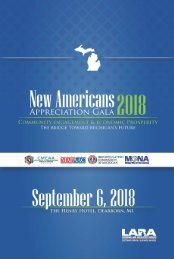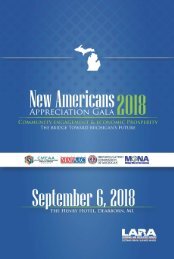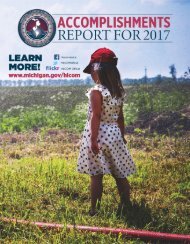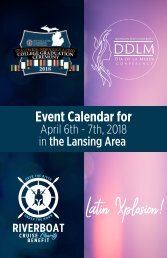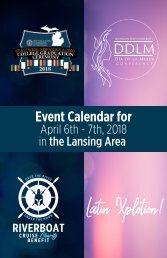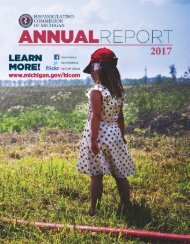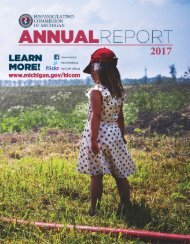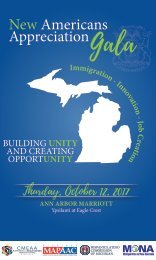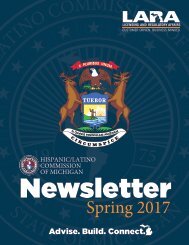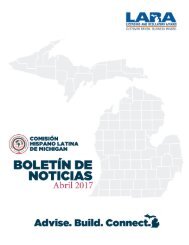MSU Latinx Film Festival Event Program
The mission of the MSU Latinx Film Festival is to create a space for the celebration and promotion of independent latinx cinema, which we conceive of inclusively as Spanish, English and Portuguese language films from Latin America, the United States and the Iberian Peninsula. We promote films that are not readily available in the U.S. that challenge audiences to see the world differently. We seek to serve as a venue for public debates about the social, cultural and political questions raised by latinx cinema through post-screening discussions, director Q&As and special events, in addition to the informal interactions organically generated by the festival. We love latinx cinema and want to share it with the Michigan State, greater Lansing and mid-Michigan communities. A committee of MSU faculty and graduate students from the Department of Romance & Classical Studies (www.rcs.msu.edu) has been organizing the inaugural edition of LxFF for over a year with initial support coming from RCS, the Film Studies Program and the Global Studies in the Arts & the Humanities Program, all housed within the College of Arts & Letters (www.cal.msu.edu). In addition to securing co-sponsorship from across the university, the festival also received a significant Creating Inclusive Excellence Grant from the MSU Office of Inclusion and Intercultural Initiatives (www.inclusion.msu.edu) that allowed the committee to realize the ambitious vision it has for LxFF. Working as a team, the LxFF organizing committee selected the festival films, designed the LxFF logo, website and promotional materials, established relationships with community collaborators, assembled panelists of faculty, graduate students, local filmmakers and community leaders and raised funds to make the festival a success. We hope you enjoy it!
The mission of the MSU Latinx Film Festival is to create a space for the celebration and promotion of independent latinx cinema, which we conceive of inclusively as Spanish, English and Portuguese language films from Latin America, the United States and the Iberian Peninsula. We promote films that are not readily available in the U.S. that challenge audiences to see the world differently. We seek to serve as a venue for public debates about the social, cultural and political questions raised by latinx cinema through post-screening discussions, director Q&As and special events, in addition to the informal interactions organically generated by the festival. We love latinx cinema and want to share it with the Michigan State, greater Lansing and mid-Michigan communities.
A committee of MSU faculty and graduate students from the Department of Romance & Classical Studies (www.rcs.msu.edu) has been organizing the inaugural edition of LxFF for over a year with initial support coming from RCS, the Film Studies Program and the Global Studies in the Arts & the Humanities Program, all housed within the College of Arts & Letters (www.cal.msu.edu). In addition to securing co-sponsorship from across the university, the festival also received a significant Creating Inclusive Excellence Grant from the MSU Office of Inclusion and Intercultural Initiatives (www.inclusion.msu.edu) that allowed the committee to realize the ambitious vision it has for LxFF. Working as a team, the LxFF organizing committee selected the festival films, designed the LxFF logo, website and promotional materials, established relationships with community collaborators, assembled panelists of faculty, graduate students, local filmmakers and community leaders and raised funds to make the festival a success. We hope you enjoy it!
You also want an ePaper? Increase the reach of your titles
YUMPU automatically turns print PDFs into web optimized ePapers that Google loves.
M S U L ATI N X<br />
FILM FESTIVAL
1ST <strong>MSU</strong> LATINX FILM FESTIVAL<br />
FEBRUARY 1-4, 2018<br />
WELCOME!<br />
The mission of the <strong>MSU</strong> <strong>Latinx</strong> <strong>Film</strong> <strong>Festival</strong> is to create a space for the celebration<br />
and promotion of independent latinx cinema, which we conceive of inclusively as<br />
Spanish, English and Portuguese language films from Latin America, the United<br />
States and the Iberian Peninsula. We promote films that are not readily available in<br />
the U.S. that challenge audiences to see the world differently. We seek to serve as a<br />
venue for public debates about the social, cultural and political questions raised by<br />
latinx cinema. We love latinx cinema and want to share it with the <strong>MSU</strong>, greater<br />
Lansing and mid-Michigan communities.<br />
This inaugural edition of the festival includes films from Bolivia, Brazil, Mexico, Peru,<br />
Spain, Venezuela and the United States (Texas & Michigan) screened over four days<br />
in five locations in three languages! All films are free and open to the public and will<br />
be followed by Q&A sessions with the directors or discussions led by <strong>MSU</strong> faculty,<br />
graduate students, local filmmakers and community leaders. Please join us at one of<br />
the special events where you can enjoy free food and drinks as well as the chance to<br />
meet the invited directors and the LxFF organizing committee.<br />
¡BIENVENIDOS! / BEM-VINDOS!<br />
La misión del <strong>Festival</strong> de cine latinx de <strong>MSU</strong> es crear un espacio para la celebración y<br />
promoción del cine independiente latinx, que creemos que incluye películas en<br />
español, inglés y portugués de América Latina, Estados Unidos y la Península<br />
Ibérica. Promovemos películas que todavía no están disponibles en Estados Unidos<br />
y que retan al público a ver el mundo una manera diferente. Buscamos ser un lugar<br />
donde debatir los asuntos culturales, sociales y políticos que muestran las películas<br />
latinx. Nos encanta el cine latinx y queremos compartirlo con Michigan State y las<br />
comunidades de Lansing y Michigan.<br />
Esta edición inaugural del festival incluye películas de Bolivia, Brazil, México, Perú,<br />
España, Estados Unidos (Texas y Michigan) y Venezuela que se proyectarán ¡durante<br />
cuatro días, cinco lugares y en tres idiomas! Todas las películas son gratis y abiertas<br />
al público, y estarán seguidas preguntas y respuestas a los directores, discusiones<br />
guidas por profesores y estudiantes de graduados de <strong>MSU</strong>, directores de cine y<br />
líderes locales. Por favor únete a nosotros durante los eventos especiales y disfruta<br />
comida y bebida gratis, y la oportunidad de conocer a los directores invitados y a los<br />
miembros del comité organizador del LxFF.<br />
msulatinxfilmfestival.com<br />
www.facebook.com/<strong>MSU</strong><strong>Latinx</strong><strong>Film</strong><strong>Festival</strong>/<br />
twitter.com/<strong>MSU</strong>LxFF
SCHEDULE / CALENDARIO<br />
FILMS / PELÍCULAS<br />
Thursday, February 1 / Jueves 1 de febrero<br />
4:00 pm - The Second Mother / Que horas ela volta? / Brazil<br />
<strong>MSU</strong> Main Library - Green Room (4 West)<br />
7:00 pm - Sealed Cargo, Carga sellada / Bolivia<br />
<strong>MSU</strong> Wells Hall B122<br />
Friday, February 2 / Viernes 2 de febrero<br />
4:00 pm - NN / Perú<br />
<strong>MSU</strong> RCAH Theater (Snyder-Phillips Hall)<br />
7:00 pm - Bad Hair, Pelo malo / Venezuela<br />
<strong>MSU</strong> RCAH Theater (Snyder-Phillips Hall)<br />
Saturday, February 3 / Sábado 3 de febrero<br />
4:00 pm - Tempest, Tempestad / México<br />
The Robin Theatre, REO Town<br />
7:00 pm - As I Walk Through The Valley / United States<br />
The Robin Theatre, REO Town<br />
Sunday, February 4 / Domingo 4 de febrero<br />
2:30 pm - The Cliff, Acantilado / Spain<br />
Studio C! Meridian Mall<br />
SPECIAL EVENTS/ EVENTOS ESPECIALES<br />
Friday, February 2 / Viernes 2 de febrero<br />
6:00 - 7:00 pm Opening Reception /Recepción de bienvenida<br />
<strong>MSU</strong> LookOut! Gallery (Snyder-Phillips Hall)<br />
Saturday, February 3 / Sábado 3 de febrero<br />
2:00 - 3:30 pm Meet & Greet With Invited Directors / Conoce y habla con los<br />
directores invitados<br />
Casa de Rosado, REO Town<br />
Sunday, February 4 / Domingo 4 de febrero<br />
4:30 - 5:00 pm Closing Reception / Recepción de despedida<br />
Studio C! Meridian Mall<br />
01 <strong>MSU</strong> <strong>Latinx</strong> <strong>Film</strong> <strong>Festival</strong> February 1-4, 2018
THE SECOND MOTHER<br />
QUE HORAS ELA VOLTA?<br />
Anna Muylaert /112 min/Brazil/2015<br />
In Portuguese with English subtitles<br />
Em português com legendas em inglês<br />
The film centers around Val, a hard-working live-in housekeeper in modern day Sao<br />
Paulo. Val seems to be perfectly content to take care of every one of her wealthy<br />
employers’ needs, from cooking and cleaning to being a surrogate mother to their<br />
teenage son, who she has raised since he was a toddler. But when Val’s estranged<br />
daughter Jessica suddenly shows up, the unspoken but intrinsic class barriers that<br />
exist within the home are thrown into disarray. Jessica is smart, confident, and<br />
ambitious, and refuses to accept the upstairs/downstairs dynamic, testing relationships<br />
and loyalties and forcing everyone to reconsider what family really means.<br />
A pernambucana Val se muda para São Paulo a fim de dar melhores condições de<br />
vida para sua filha Jéssica. Com muito receio, ela deixa a menina no interior de<br />
Pernambuco para ser babá de Fabinho, morando integralmente na casa de seus<br />
empregadores num bairro rico de São Paulo. Treze anos depois, quando o menino<br />
vai prestar vestibular, Jéssica lhe telefona, pedindo ajuda para ir à São Paulo, no<br />
intuito de prestar a mesma prova. Os empregadores de Val recebem a menina de<br />
braços abertos, só que quando ela deixa de seguir a hierarquia social estabelecida a<br />
situação se complica.<br />
About the director/Sobre a diretora<br />
Born in São Paulo in 1964, Anna Muylaert studied cinema at ECA/USP where she<br />
directed many shorts, among them the awarded The Origin of Babies (winner best<br />
film São Paulo <strong>Film</strong> <strong>Festival</strong>). The Second Mother was sold to over 30 countries and<br />
received prizes at Sundance and the Berlin <strong>Film</strong> <strong>Festival</strong>. Don’t Call Me Son is her<br />
newest film.<br />
Nascida em São Paulo em 1964, Anna Muylaert estudou cinema na ECA / USP, onde<br />
dirigiu muitos curtas, entre eles o premiado A origem dos bebês segundo Kiki<br />
Cavalcanti (vencedor do melhor filme de São Paulo <strong>Film</strong> <strong>Festival</strong>). Que Horas Ela<br />
Volta? foi vendido para mais de 30 países e premiado em Sundance e no <strong>Festival</strong> de<br />
Cinema de Berlim . Mãe Só Há Uma é o seu mais novo filme.<br />
A 30 minute discussion of the film will follow the screening hosted by Scott Boehm with Leonora Souza<br />
Paula (Residential College in the Arts and Humanities), Saulo Gouveia (Romance and Classical Studies),<br />
and Peter Beattie (History).<br />
msulatinxfilmfestival.com 02
SEALED CARGO<br />
CARGA SELLADA<br />
Julia Vargas /107 min/Bolivia/2015<br />
In Spanish with English subtitles<br />
En español con subtítulos en inglés<br />
With a promotion in the offing and his beautiful wife Nena at his side, things<br />
couldn’t be better for ambitious policeman Hector Mariscal. Before he can enjoy the<br />
good life, though, a final top-secret assignment must be carried out: to transport-by<br />
rail-a highly toxic cargo across Bolivia’s high desert backcountry and “dispose” of it in<br />
a remote indigenous village. With kindly engineer Klinger guiding his beloved<br />
steam locomotive Federica, and presented with a crew of hapless cops and an<br />
unexpected young stowaway, Mariscal finds that there’s much more on the line than<br />
he imagined in this sharp, energetic satire.<br />
Una carga misteriosa de supuestos minerales tóxicos aparece en la planicie andina<br />
alertando a la población. El gobierno encarga a un ambicioso capitán de policía la<br />
misión secreta de deshacerse de ellos, desentendiéndose luego de su destino. A<br />
cargo de un grupo de policías y un maquinista anarquista, el recorrido de rutina se<br />
convierte en un viaje errante y trágico.<br />
About the director/ Sobre la directora<br />
Julia Vargas is a photographer and screenwriter, with international awards and a Life<br />
Achievement Award (2005). As the first woman photographer in Bolivia, Vargas has<br />
photographed everyday life and personalities for 50 years. She has shown her work<br />
in 30 exhibits in Europe, USA, and South America. She created and directed an<br />
educational/communicational NGO that benefits working children. She started<br />
working as a filmmaker in 1991.<br />
Julia Vargas es una fotógrafa y guionista con premios internacionales y el Life<br />
Achievement Award (2005). Como primera mujer fotógrafa, Vargas ha fotografiado<br />
la vida y personalidades bolivianas por 50 años. Ha mostrado su trabajo en 30<br />
exposiciones en Europa, USA y Sudamérica. Creó y dirigió una ONG educacional y<br />
comunicativa que beneficia a niños trabajadores. Comenzó a trabajar como directora<br />
en 1991.<br />
A 30 minute discussion of the film will follow the screening hosted by Osvaldo Sandoval with Laurie<br />
Medina (Anthropology) and Stephen Gasteyer (Sociology).<br />
03 <strong>MSU</strong> <strong>Latinx</strong> <strong>Film</strong> <strong>Festival</strong> February 1-4, 2018
NN<br />
Héctor Gálvez/89 min/Perú/2014<br />
In Spanish with English subtitles<br />
En español con subtítulos en inglés<br />
A group of forensic anthropologists digs up the corpses of eight people who<br />
disappeared without a trace 20 years ago during a violent political period in Peru.<br />
Among them, they find a ninth unidentified corpse. The only thing that can lead to<br />
the identity of the man is the vague photo of a smiling girl found in his shirt’s<br />
pocket.<br />
Un grupo de antropólogos forenses desenterró los cadáveres de ocho personas que<br />
desaparecieron sin dejar rastro hace 20 años durante un período político violento<br />
en Perú. Entre ellos, encuentran un noveno cadáver no identificado. Lo único que<br />
puede conducir a la identidad del hombre es la foto de una joven sonriente que se<br />
encontraba en el bolsillo de su camisa.<br />
About the director/ Sobre el director<br />
NN (Non Nomine) is Héctor Gálvez’s second feature film. It obtained funding from<br />
the Hubert Bals Development Fund, the Cinémas du Monde Fund, the World<br />
Cinema Fund and the Ibermedia Fund. It won the Best Unproduced Script at the<br />
2011 Havana <strong>Film</strong> <strong>Festival</strong>.<br />
NN (Non Nomine) es el segundo largometraje de Héctor Gálvez. Obtuvo fondos del<br />
Hubert Bals Development Fund, Cinémas du Monde Fund, World Cinema Fund y<br />
Ibermedia Fund. Ganó el premio al mejor Unproduced Script en el festival de cine<br />
de La Habana en 2011.<br />
A 30 minute discussion of the film will follow the screening hosted by Claudia Berrios-Campos with Rocío<br />
Quispe-Agnoli (Romance and Classical Studies), Elizabeth Drexler (Anthropology), and Rael Mora<br />
(Wayka.pe).<br />
msulatinxfilmfestival.com 04
BAD HAIR<br />
PELO MALO<br />
Mariana Rondón/93 min/Venezuela/2013<br />
In Spanish with English subtitles<br />
En español con subtítulos en inglés<br />
Junior, a young nine year old boy, lives in Caracas in a shoddy apartment complex<br />
with his mother and baby brother. He has "pelo malo," a hispanic term for curly,<br />
unruly hair, which he constantly attempts to straighten.<br />
This obsession with straightening his hair elicits a tidal wave of homophobic panic<br />
in his hard-working mother.<br />
Junior tiene nueve años y vive en Caracas en un complejo de apartamentos de<br />
aspecto lamentable junto a su madre y su hermano pequeño. Tiene el "pelo malo",<br />
un término hispánico para denominar al cabello rizado y rebelde. Junior expresa su<br />
deseo de alisar su cabello, especialmente cuando tiene que tomarse una foto para la<br />
escuela. Esto provoca un gran pánico homofóbico en su madre.<br />
About the director/ Sobre la directora<br />
Mariana Rondón is a Venezuelan cinema director, screenwriter, producer and visual<br />
artist. She studied at Escuela Internacional de Cine y Televisión (San Antonio de los<br />
Baños International School), in Cuba, and later animation in France. In 1990 she<br />
created the Andean Multinational Company “Sudaca <strong>Film</strong>s” together with other<br />
Latin American film makers.<br />
Mariana Rondón es una directora de cine, guionista, productora y artista visual<br />
venezolana. Estudió en la Escuela Internacional de Cine y Televisión (Escuela<br />
Internacional de San Antonio de los Baños), en Cuba, y más tarde animación en<br />
Francia. En 1990 creó la Compañía Multinacional Andina "Sudaca <strong>Film</strong>s" junto con<br />
otros cineastas latinoamericanos.<br />
A 30 minute discussion of the film will follow the screening hosted by Yomaira Figueroa with Danny<br />
Méndez (Romance and Classical Studies), Jeff Wray (<strong>Film</strong> Studies), and Tama Hamilton-Wray (Residential<br />
College in the Arts and Humanities).<br />
05 <strong>MSU</strong> <strong>Latinx</strong> <strong>Film</strong> <strong>Festival</strong> February 1-4, 2018
TEMPEST<br />
TEMPESTAD<br />
Tatiana Buezo/105 min/México/2016<br />
In Spanish with English subtitles<br />
En español con subtítulos en inglés<br />
Tempest narrates the parallel journey of two women and it reflects the impact of the<br />
violence and impunity that afflict México. Miriam is arrested on suspicion of human<br />
trafficking. After her detention, she is handed over to a private prison controlled by<br />
the Organized Crime, where she is forced to pay a monthly fee to remain alive. Adela<br />
works as a clown in a traveling circus. Ten years ago, her life was irreversibly transformed;<br />
every night during the show, she evokes her missing daughter.<br />
Tempestad narra el viaje paralelo de dos mujeres y refleja el impacto de la violencia<br />
y la impunidad que afligen a México. Miriam es arrestada bajo sospecha de trata de<br />
personas. Después de su detención, la llevan a una prisión privada controlada por el<br />
Crimen Organizado donde la obligan a pagar una tarifa mensual para permanecer<br />
con vida. Adela trabaja como payaso en un circo ambulante. Hace diez años su vida<br />
se transformó irreversiblemente y todas las noches durante el show, ella evoca a su<br />
hija desaparecida.<br />
About the director/ Sobre la directora<br />
Tatiana Huezo was born in El Salvador and moved to Mexico when she was five.<br />
She’s the recipient of the Gucci/Ambulante award, a grant established in 2007 to<br />
support new and established Mexican documentarians.Tempest has screened at<br />
more than 60 film festivals worldwide, collecting awards in Berlin, Lima, Havana,<br />
Madrid, Cork, and many others.<br />
Tatiana Huezo nació en El Salvador y se mudó a México cuando tenía cinco años.<br />
Recibió el premio Gucci/Ambulante, una subvención establecida en 2007 para<br />
apoyar a nuevos documentalistas mexicanos. Tempestad se ha proyectado en más<br />
de 60 festivales de cine de todo el mundo y ha recogido, entre otros muchos,<br />
premios en Berlín, Lima, La Habana, Madrid, Cork y muchos otros.<br />
A 30 minute discussion of the film will follow the screening hosted by Miguel A. Cabañas with María<br />
Serrato (Capital Area Latina Youth), Erin Graham (History), and Alexandra Hidalgo (Writing, Rhetoric &<br />
American Cultures).<br />
msulatinxfilmfestival.com 06
AS I WALK THROUGH THE VALLEY<br />
Charlie Vela & Ronnie Garza/81 min<br />
Estados Unidos/2017<br />
In English<br />
Directors in attendance<br />
Los directores van a asistir a la proyección<br />
As I Walk Through The Valley documents 40 years of musical history and Mexican-American<br />
culture. It is the first comprehensive look at rock music in the Rio<br />
Grande Valley. The film is an oral history of the popular music of The Valley told by<br />
the musicians, promoters, producers, and scenesters who lived it. The Rio Grande<br />
Valley has been called a flashpoint for the creation of Mexican-American Culture in<br />
the United States. Roughly 230 miles south of San Antonio, the river delta known as<br />
The Valley is a network of cities and roads that sits at the southernmost border<br />
between the United States and Mexico. Combining over 100 hours of interviews as<br />
well as never-before-seen archival footage and photographs, this documentary<br />
tracks the musical evolution of a region that has forged its own unique identity<br />
between two countries.<br />
As I Walk Through The Valley documenta 40 años de historia musical y cultural<br />
mexicano-estadounidense. Es la primera mirada a la música rock en el Valle del Río<br />
Grande. La película es una historia oral de la música popular de The Valley contada<br />
por los músicos, promotores, productores y actores que la vivieron. El Valle del Río<br />
Grande ha sido un punto álgido para la creación de la cultura mexicano-estadounidense<br />
en los Estados Unidos. Aproximadamente a 230 millas al sur de San Antonio,<br />
el delta del río conocido como The Valley es una red de ciudades y carreteras que se<br />
encuentra en la frontera más al sur entre los Estados Unidos y México. Combinando<br />
más de 100 horas de entrevistas, tomas de archivo y fotografías nunca antes vistas,<br />
este documental rastrea la evolución musical de una región que ha forjado su<br />
propia identidad entre dos países.<br />
More information about the directors in page 10.<br />
A 30 minute Q&A with the directors will follow the screening hosted by John Valadez (<strong>Film</strong> Studies).<br />
07 <strong>MSU</strong> <strong>Latinx</strong> <strong>Film</strong> <strong>Festival</strong> February 1-4, 2018
THE CLIFF<br />
ACANTILADO<br />
Helena Taberna/99 min/España/2016<br />
In Spanish with English subtitles<br />
En español con subtítulos en inglés<br />
Director in attendance<br />
La directora va a asistir a la proyección<br />
Gabriel is a promising attorney whose life is turned upside down when he receives a<br />
phone call from the police. A sect has committed mass suicide in the Canary Islands<br />
and his sister Cordelia was one of the followers. Her cadaver is yet to be found.<br />
Gabriel hasn’t seen his younger sibling in years but departs immediately for the<br />
islands to find out what’s happening and to help with the investigation. There he<br />
meets Cordelia’s feisty friend Helena, full of raw emotions. They both share their<br />
desire to find Cordelia, alive. Gabriel quickly discovers that Heidi Meyer, a magnetic<br />
woman with dark origins, seduced his sister into “The Community.” Cordelia found<br />
refuge in the sect, where she was able to work through the wounds of the past, only<br />
to become a witness—and an accomplice—to strange events that preceded a tragic<br />
ending.<br />
Gabriel es un prometedor fiscal cuya vida se tambalea cuando recibe una llamada<br />
de la policía. Ha habido un suicidio colectivo de una secta en las islas Canarias y su<br />
hermana pequeña, Corde- lia, era una de las adeptas. Su cadáver no ha aparecido.<br />
Gabriel lleva años sin ver a su hermana, pero inmediatamente viaja a la isla para<br />
conocer los sucesos de primera mano y ayudar en la investigación. Allí conoce a<br />
Helena, amiga de Cordelia, de fuerte personalidad y emociones a or de piel. Ella y<br />
Gabriel conectan inmediatamente, unidos por el deseo de encontrar viva a Cordelia.<br />
Muy pronto Gabriel descubre que su hermana se acercó a “La Comunidad” seducida<br />
por la líder de la secta, una mujer de gran magnetismo y oscuro origen. Cordelia<br />
encontró en aquel grupo un refugio donde sobreponerse de las heridas del pasado,<br />
pero también acabó convirtiéndose en testigo y cómplice de extraños sucesos,<br />
preludio de un trágico desenlace.<br />
More information about the director in page 10.<br />
A 30 minute Q&A with the directors will follow the screening hosted by Joseba Gabilondo<br />
(Romance and Classical Studies).<br />
msulatinxfilmfestival.com 08
WHAT HAPPENS TO A DREAM<br />
DEFERRED<br />
Scott Boehm & Peter Johnston / 10 min<br />
Estados Unidos / 2018<br />
In Spanish and English with Subtitles<br />
En español y inglés con subtítulos<br />
Director in attendance<br />
El director va a asistir a la proyección<br />
Plays Before Sealed Cargo, Bad Hair, As<br />
I Walk Through the Valley and The Cliff<br />
A short film about two DREAMers who are graduate students at Michigan State University (and members<br />
of the LxFF organizing committee), What Happens to a Dream Deferred is an intimate portrait of a day in<br />
the life of José Adrián Badillo Carlos and Osvaldo Sandoval after the Trump administration’s decision to<br />
rescind the Deferred Action for Childhood Arrivals policy.<br />
Corto sobre dos DREAMers estudiantes graduados en Michigan State University (y miembros del comité<br />
organizador del LxFF). What Happens to a Dream Deferred es un íntimo retrato de la vida diaria de José<br />
Adrián Badillo Carlos y Osvaldo Sandoval después de que la administración de Trump decidiera prescindir<br />
de la política Deferred Action for Childhood Arrivals.<br />
ABOUT THE FILMMAKERS / Sobre los cineastas<br />
Scott Boehm (Writer & Director) is Assistant Professor of Spanish & Global Studies and Affiliated Faculty in<br />
the <strong>Film</strong> Studies <strong>Program</strong> at Michigan State University as well as the Director of the <strong>MSU</strong> <strong>Latinx</strong> <strong>Film</strong><br />
<strong>Festival</strong>. Scott studied screenwriting at La Factoría del Guión in Madrid, Spain and has worked as a script<br />
consultant on several films, including The Cliff (Helena Taberna, 2016) and Growing Hmong at the<br />
Crossroads (Safoi Babana-Hampton, 2017). What Happens to a Dream Deferred is his directorial debut.<br />
Peter Johnston (Cinematographer & Editor) is the Digital Media/<strong>Film</strong> Production Manager in the <strong>Film</strong><br />
Studies <strong>Program</strong> at Michigan State University and holds a B.F.A. in Photography from Alma College and<br />
an M.A. in Digital Media Technology from <strong>MSU</strong>. Peter has directed, produced, filmed and/or edited a<br />
variety of short fiction, documentary and experimental films, including Ka-dy Comes Home, Hmong<br />
Memory at the Crossroads, Migrations of Islam, Within, On the Open Road, and Mr. Henderson.<br />
Scott Boehm (guionista y director) es professor asistente de estudios españoles y globales, y profesor<br />
afiliado en el programa de estudios cinematográficos en Michigan State University, así como el director<br />
del festival de cine latinx de <strong>MSU</strong>. Scott estudió guión en La Factoría del Guión en Madrid, España y ha<br />
trabajado como guionista en varias películas, entre ellas Acantilado (Helena Taberna, 2016) y Growing<br />
Hmong at the Crossroads (Safoi Babana-Hampton, 2017). What Happens to a Dream Deferred es su debut<br />
como director.<br />
Peter Johnston (director de fotografía y editor) es el gerente de producción de medios digitales/cine en el<br />
programa de estudios cinematográficos en Michigan State University. Estudió una licenciatura en<br />
fotografía en Alma College y una maestría en tecnología de medios digitales en Michigan State<br />
University. Peter ha dirigido, producido, filmado y/o editado varios cortos de ficción, documentales y<br />
películas experimentales, incluyendo Ka-dy Comes Home, Hmong Memory at the Crossroads, Migrations<br />
of Islam, Within, On the Open Road, and Mr. Henderson.<br />
09 <strong>MSU</strong> <strong>Latinx</strong> <strong>Film</strong> <strong>Festival</strong> February 1-4, 2018
Directors in Attendance<br />
Directores invitados<br />
Helena Taberna<br />
España<br />
Helena Taberna’s films have received critical and popular acclaim and have landed<br />
numerous awards at national and international film festivals. She has directed<br />
well-known films such as Yoyes (2000), Extranjeras (2003) and La buena nueva<br />
(2008); the film that confirmed her as a successful director committed to portraying<br />
subjects of social interest. In 2002, she created her own production company, Lamia<br />
Producciones, and in 2006 she founed the Association of Women <strong>Film</strong>makers (CIMA)<br />
with six other Spanish women directors.<br />
Las películas de Helena Taberna han sido aclamadas por la crítica y la audiencia, y<br />
han obtenido numerosos premios en festivales de cine nacionales e internacionales.<br />
Ha dirigido películas reconocidas como Yoyes (2000), Extranjeras (2003) o La buena<br />
nueva (2008); película que la confirmó como una exitosa directora dedicada a<br />
retratar temas de interés social. En 2002 creó su propia productora, Lamia Producciones.<br />
En 2006 fundó la Asociación de mujeres cineastas y de medios audiovisuales<br />
(CIMA) junto con otras seis directoras del cine español.<br />
Charlie Vela &<br />
Ronnie Garza<br />
Estados Unidos<br />
Directors Charlie Vela & Ronnie Garza are first-time feature filmmakers. They both<br />
grew up in the RGV punk scene of the late-90’s/early-00’s. In 2014, they decided to<br />
take on the challenge of documenting the history of the scene that helped shape<br />
them as artists as it was clear that there was little outside interest in doing so.<br />
Without formal training, a crew, or funding they began production, learning along<br />
the way, and in 2017 As I Walk Through The Valley premiered at SXSW International<br />
<strong>Film</strong> <strong>Festival</strong>.<br />
Charlie Vela y Ronnie Garza son directores de cine nóveles. Ambos crecieron en la<br />
escena punk RGV de finales de los 90 y comienzos de los 2000. En 2014, decidieron<br />
asumir el desafío de documentar la historia de la escena que los ayudó a formarse<br />
como artistas, ya que pocos habían mostrado interés en hacerlo. Comenzaron la<br />
producción de As I Walk Through The Valley sin formación formal, un equipo o<br />
financión; pero consiguieron estrenarla en 2017 en el festival de cine internacional<br />
SXSW.<br />
msulatinxfilmfestival.com 10
THANKS<br />
LxFF ORGANIZING COMMITTEE/COMITÉ ORGANIZATIVO DE LxFF<br />
Scott Boehm (LxFF Director), Assistant Professor of Spanish & Global Studies<br />
José Adrián Badillo-Carlos, PhD Candidate in Hispanic Cultural Studies<br />
Claudia Berrios-Campos, PhD Candidate in Hispanic Cultural Studies<br />
Miguel Cabañas, Associate Professor of Spanish<br />
Judit Fuentecuesta, PhD Candidate in Hispanic Cultural Studies<br />
Osvaldo Sandoval, PhD Candidate in Hispanic Cultural Studies<br />
COMMUNITY PARTNERS/SOCIOS COMUNITARIOS<br />
The Robin Theatre, Casa de Rosado, Studio C!, East Lansing <strong>Film</strong> <strong>Festival</strong>, Lansing<br />
Public Media Center<br />
VOLUNTEERS/VOLUNTARIOS<br />
Andrew Bentley, John Brown, Viridiana García-Hernández, Mary Ann Lugo, Julio<br />
César Paredes, Connie Rojas<br />
SPECIAL THANKS/AGRADECIMIENTOS ESPECIALES<br />
Ayden Byrnes, Lexis Guarnaccia, Yomaira Figueroa, Ashley Fuente, Paulette<br />
Granberry Russell, Peter Johnston, Jackie Leavitt, Russell Lucas, José Luis Méndez,<br />
Douglas Noverr, Rocío Quispe-Agnoli, Dylan Rogers, Theresa Rosado, Leonora<br />
Souza Paula, Susan Woods, Joshua Yumibe, Justin Ziegler<br />
<strong>MSU</strong> SPONSORS/PATROCINADORES DE <strong>MSU</strong><br />
Office for Inclusion & Intercultural Initiatives<br />
Department of Romance & Classical Studies<br />
Global Studies in the Arts & Humanities <strong>Program</strong><br />
<strong>Film</strong> Studies <strong>Program</strong><br />
College of Arts & Letters<br />
College of Communication Arts & Sciences<br />
Chicano/Latino Studies <strong>Program</strong><br />
Citizens Scholars <strong>Program</strong><br />
Council of Graduate Students<br />
Residential College in the Arts & Humanities<br />
James Madison College<br />
<strong>MSU</strong> Libraries<br />
Center for Latin American & Caribbean Studies<br />
Center for Gender in Global Context<br />
History Department<br />
Julian Samora Research Institute<br />
Peace and Justice Studies<br />
11 <strong>MSU</strong> <strong>Latinx</strong> <strong>Film</strong> <strong>Festival</strong> February 1-4, 2018
The Spanish <strong>Film</strong> Club series was made possible with the support of Pragda, SPAIN<br />
arts & culture and the Secretary of State for Culture of Spain.<br />
msulatinxfilmfestival.com<br />
www.facebook.com/<strong>MSU</strong><strong>Latinx</strong><strong>Film</strong><strong>Festival</strong>/<br />
twitter.com/<strong>MSU</strong>LxFF




